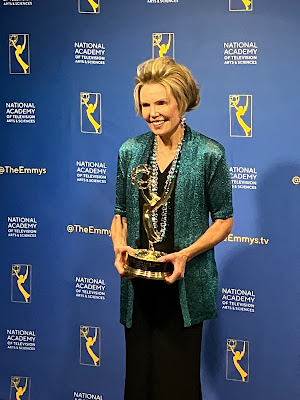 |
| LesleyVisser with her Emmy statuette. |
Lesley Visser, one of the pioneers for women in sports broadcasting, was honored with the Sports Lifetime Achievement Award at the 43rd Annual Sports Emmy Awards on Tuesday night at Jazz at Lincoln Center. She is the first woman to receive the honor.
Visser began her career as the first woman to cover an NFL team when the Boston Globe assigned her to be the New England Patriots beat writer in 1976.
That was the first of many "firsts" in her illustrious career. While at CBS Sports, she was the first woman on the network broadcasts of the Final Four, Super Bowl, NBA Finals, and World Series.
Visser then conquered the world of football broadcasting, as she became the first woman on Monday Night Football, the first woman to serve as an NFL analyst on both radio and TV, and the first and ONLY woman to present the championship Lombardi Trophy at the Super Bowl. It all led to her being enshrined in the Pro Football Hall of Fame.
And, if that's not enough, she was the first woman sportscaster to carry the Olympic torch.
Justine Gubar, the Head of Sports Awards for the National Academy of Arts and Sciences (NATAS) said, "To be a pioneer at nearly every juncture of sports reporting isn't easy despite how Lesley Visser makes it look. She has spent her career serving as an unparalleled role model and mentor to countless up-and-coming journalists including myself. Her generous spirit, breadth and depth of knowledge, and professionalism shine in our industry."
 |
| From the Sports Emmys program. |
CBS Sports chairman Sean McManus made the call, and Visser said she was "overwhelmed," and said in the program, "I told Sean, 'You can't say this is the wrong number or that you take it back! I really couldn't have anticipated anything like this."
It is fitting that McManus made the call because his father, Jim McKay, was the first recipient of the Academy's Sports Lifetime Achievement Award, and he worked with Visser during her time at ABC, which she calls "one of the highlights of my career," and, "This has come full circle. As a writer and a storyteller, Jim McKay is someone I greatly admired."
McManus said in the events's program, "Very few people have had the word first attached to them throughout their career as much as Lesley, and even fewer have created a place in an industry that never existed."
Visser is a Boston native who grew up loving sports. She would go to Boston Red Sox games with her older brother, Chris, and she still believes that "the 6-4-3 double play is the most exciting play in baseball."
One day, when Lesley was 10 years old, she was asked by her mother, Mary, what she wanted to do when she grew up, and she said she wanted to be a sportswriter. The only problem was, that in 1964, there were only men in the press box. Mary Visser, who was an English teacher, for more than 30 years, did not dismiss her goal, and encouraged her daughter to follow her passion for sportswriting. As he told her daughter, "Sometimes you have to cross when it says don't walk."
When Visser started working for The Boston Globe when she was just 21 years old, and joined a legendary sports section, with mentors like Will McDonough and Bud Collins.
Visser says she has worked with "about 70 percent" of the winners of the Lifetime Achievement Award, including Dick Enberg, Al Michaels, Verne Lundquist, Frank Gifford, Jim McKay, and someone likely to receive the honor in the future, Jim Nantz.
Working with John Madden, the 2009 Lifetime honoree, was one of the greatest highlights of her career. Madden had a cherished message for her when she was named to the Pro Football Hall of Fame in 2006, an it read, "You can't be born into the Hall of Fame; you can't buy your way into the Hall of Fame; you have to earn in." They were very close, and Visser was asked to speak at his memorial service after he passed in December 2021.
"I always have had an attitude of gratitude," Visser said in the Sports Emmys program. "When I broke in, I understood this was new in the culture. I was as new to the players, coaches, readers and viewers as they were to me. I understood it was a true frontier. I was grateful, even though there were no provisions for equality regarding the locker room. I still couldn't believe that something I had dreamed of from the time I was 10 years old was actually happening."
No comments:
Post a Comment